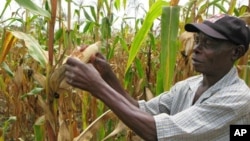The United States and Brazil have a long history of strong bilateral relations. The two countries hold similar views and goals on many issues. For example, both countries are committed to expanding inclusive economic growth and prosperity, promoting international peace and security and respect for human rights, and helping people in need, not just in the United States and Brazil, but globally.
This is particularly true in countries that face chronic hunger, such as Mozambique.
Two decades ago, Mozambique emerged from 16 years of civil war that left it in shambles, and the twenty years of stability and peace since then have seen significant strides forward, including impressive economic growth.
Nonetheless, Mozambique is prone to natural disasters such as droughts and floods, which damage the agricultural sector and the country’s overall economy. That is one reason why much of the rural population is impoverished, and as much as 64 percent of Mozambicans are food-insecure.
Over the past 4 years, the U.S. Agency for International Development, or USAID, the University of Florida and Michigan State University, and the Brazilian Cooperation Agency, or ABC, and other Brazilian government agencies, have partnered with the government of Mozambique to work on reducing poverty, hunger, and malnutrition as part of Feed the Future, the U.S. Government’s global hunger and food security initiative The idea is to help strengthen the country’s capacity to produce more high-quality and nutritious foods like vegetables, oilseeds and grain legumes.
The partnership works with family and subsistence farmers to help them increase their yields, and then enable them to bring their product to the market. The program strengthened the capacity of Mozambique’s Agriculture Research Institute (IIAM) in research administration, seed production and land-use planning.
It also worked to improve communication and extension information dissemination, including training and support to extension technicians. Experts from Brazil and the U.S. partners cooperated closely with Mozambican counterparts in making these gains.
Farmers were also trained in new crop management practices, such as more environmentally sensitive irrigation technologies. They also learned how to plant better and more disease-resistant crop varieties and improve post-harvest handling in ways that reduced losses and increased incomes.
On June 30th, during a meeting with Brazilian President Dilma Rousseff, President Barack Obama announced an additional 2 million dollars for expanding the USAID and ABC partnership to help Mozambique attain food security for all.
No one should have to go to bed hungry. A hunger-free world is possible within our generation The United States and Brazil are working to reach that goal, one country at a time.

















